Fact Check: Is the Military Overreaching? The Truth Behind DoD Directive 5240.01's Expanded 'Lethal' Authority
The September 2024 update to DoD Directive 5240.01 significantly expands military intelligence powers, raising concerns about constitutional protections and government overreach in domestic law enforc
Quick Summary:
The updated DoD Directive 5240.01 was released on September 27, 2024, and it outlines broader military powers, including lethal force, in domestic law enforcement contexts.
The directive expands the role of military intelligence in civilian law enforcement and includes provisions allowing lethal force under certain emergency conditions.
Critics argue that this update may erode constitutional protections under the Posse Comitatus Act, particularly as it permits commanders to act without prior authorization in cases of imminent threats.
Our original October 7th report was the basis for a social media firestorm of discussion and reporting, resulting in over 1 billion content views on the topic in the past week, including suggestions in X's proposed Community Notes that concerns were over-inflated or misguided; this article fact-checks and puts those concerns to rest.
The September 2024 Update to DoD Directive 5240.01
On September 27, 2024, the Department of Defense (DoD) released an updated version of DoD Directive 5240.01, which governs the involvement of military intelligence in domestic law enforcement. This update introduces significant changes to the previous framework, most notably by expanding the conditions under which military intelligence can assist civilian law enforcement and authorizing the use of lethal force in certain emergency situations.
Read the DoD Directive 5240.01 here.
This article will provide a detailed fact-check of the 2024 directive, address the misconceptions that have circulated since its release, and highlight key concerns regarding the balance between national security and constitutional protections.
For more in-depth coverage of this topic, GreenMedInfo previously published an investigative report on October 7, 2024, titled "DoD Directive 5240.01: The Stealth Expansion of Military Intelligence Powers in Life-or-Death DomesticScenarios." This current article will provide additional context and clarification regarding the most recent updates.
Key Updates to the 2024 Version of DoD Directive 5240.01
Expansion of Military Authority in Domestic Law Enforcement
The updated directive now clearly allows for broader military involvement in domestic law enforcement, especially under emergency conditions. While the directive primarily focuses on intelligence support, it explicitly permits military commanders to use lethal force if an imminent threat is identified.
Previously, military involvement in domestic affairs was heavily restricted by the Posse Comitatus Act and other safeguards that kept the military separate from civilian law enforcement functions. However, the 2024 directive blurs these boundaries by granting military personnel the ability to intervene in specific, high-risk situations, including using force before receiving direct approval from the Secretary of Defense (SECDEF). Commanders can act in such scenarios if they seek post-action approval within 72 hours, creating a potentially dangerous precedent.
Common Misconceptions and Clarifications
Misconception 1: "The DoD Has Always Had This Authority"
This claim, circulated by individuals like Jon Herold (@patel_patriot) on social media, suggests that the military's authority to use lethal force in support of domestic law enforcement is nothing new. However, this assertion is misleading.
Correction: While the military has always had some authority to use lethal force in certain scenarios--such as protecting DoD personnel--the 2024 update to DoD Directive 5240.01 significantly expands the circumstances in which military personnel can use lethal force domestically. The directive now allows for direct military involvement in civilian law enforcement operations under emergency conditions, including situations where there is an imminent threat. This broader scope marks a shift from previous versions of the directive.
For a more detailed look at Jon Herold's post and related claims, visit the link here.
Another Misleading Claim: The DoD Has Always Had This Authority
A further attempt to downplay concerns suggests that the DoD has always had the authority to use lethal force domestically, thereby implying that the 2024 update is simply a continuation of existing practices. However, this argument fails to consider the restrictions of the Posse Comitatus Act, which has long limited military involvement in domestic law enforcement without special congressional or executive authorization. While the DoD has had broad authority in foreign operations, domestic use of lethal force has been significantly more constrained.
Moreover, references to the National Security Act of 1947 are misleading. While the Act restructured the military and intelligence communities, it did not grant the DoD broad domestic lethal force authority. The 2024 directive explicitly expands the military's involvement in domestic affairs, particularly by allowing military intelligence personnel to use lethal force in law enforcement scenarios. This marks a clear policy shift rather than a mere reaffirmation of past practices, highlighting another failed attempt to dismiss the real concerns about the directive's implications.
Misconception 2: "It Only Applies to Intelligence, Not Physical Military Involvement"
Another common misunderstanding is that the directive is limited to intelligence support and does not authorize physical military action. While the directive's primary focus is on intelligence, this interpretation misses key details about the directive's provisions.
Correction: The 2024 version clearly states that military commanders can take physical action, including the use of lethal force, in cases where intelligence operations identify an imminent threat. This allows for military personnel to physically intervene in certain situations, making the directive much more than just an intelligence-sharing framework. In emergency situations, commanders can act without prior approval from the SECDEF, expanding the military's potential role in domestic law enforcement.
Constitutional Concerns: The Erosion of Posse Comitatus Protections
The expanded military role outlined in DoD Directive 5240.01 raises significant concerns about the erosion of constitutional protections, particularly those guaranteed by the Posse Comitatus Act. The act traditionally limits the military's involvement in civilian law enforcement, requiring congressional or presidential authorization for military intervention.
However, the 2024 update to the directive expands the military's role in civilian law enforcement,creating a pathway for military personnel to act in cases of national security emergencies. Critics argue that this expansion threatens the balance of power between civilian and military authorities and could lead to overreach in situations that would traditionally be handled by civilian law enforcement agencies. Moreover, the Covid-19 era saw the DHS redefine domestic threat actors to include those who questioned Covid-19 origins, or the presumed safety or efficacy of mRNA vaccines, effectively putting dissent or expressing heterodox narratives (Constitutionally protected freedoms) on the same footing as 'threatening national security.' It is within these profoundly shifting contexts that the recent DoD reissuance changes take on greater concern to the public.
As discussed in GreenMedInfo's October 7 report, the expanded military powers under the directive could also be seen as a stepping stone toward greater military involvement in civilian matters, potentially leading to situations where the military bypasses constitutional safeguards intended to protect civil liberties.
Conclusion: What's Next for DoD Directive 5240.01?
The September 27, 2024, update to DoD Directive 5240.01 represents a significant shift in how military intelligence and lethal force can be used in domestic law enforcement scenarios. While the directive is framed as a necessary tool for national security, its expanded powers raise critical questions about constitutional protections, civilian oversight, and the potential for government overreach.
As this directive continues to be scrutinized, it is essential for the public to stay informed and engaged in discussions about the role of the military in domestic law enforcement. The potential for abuse of these expanded powers is real, and the implications for civil liberties should not be taken lightly.
Thanks to the firestorm of activity on platforms like X, and the concern expressed by figures such as RFK Jr., Ron Paul, Alex Jones, Vigilant Fox, and hundreds of thousands of others, there is a growing chorus of requests for Congressional inquiry into this matter.
In our Constitutional Republic, an issue of this gravity deserves thorough examination. We encourage you to:
Share this story with others to raise awareness
Engage in respectful discourse about the implications of these policy changes
Contact your representatives if you have concerns about these developments
Your informed participation is crucial in maintaining the checks and balances of our democratic system.
For more on this topic and the implications of DoD Directive 5240.01, read GreenMedInfo's full investigative report from October 7, 2024, here.

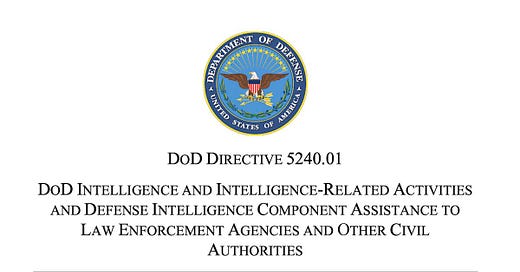


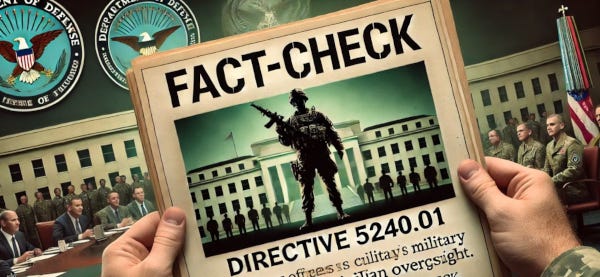

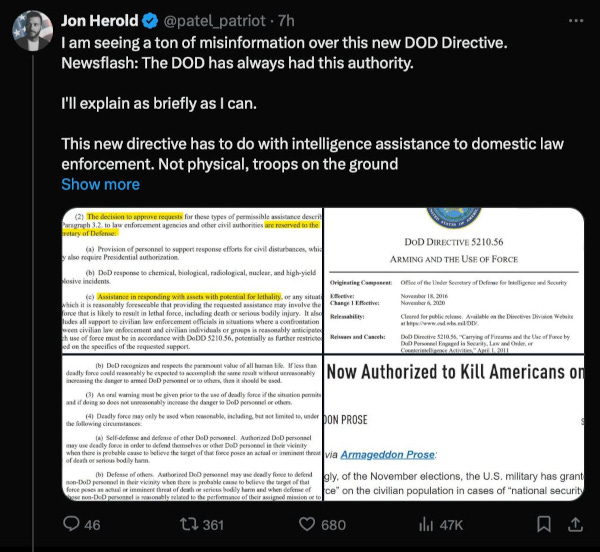
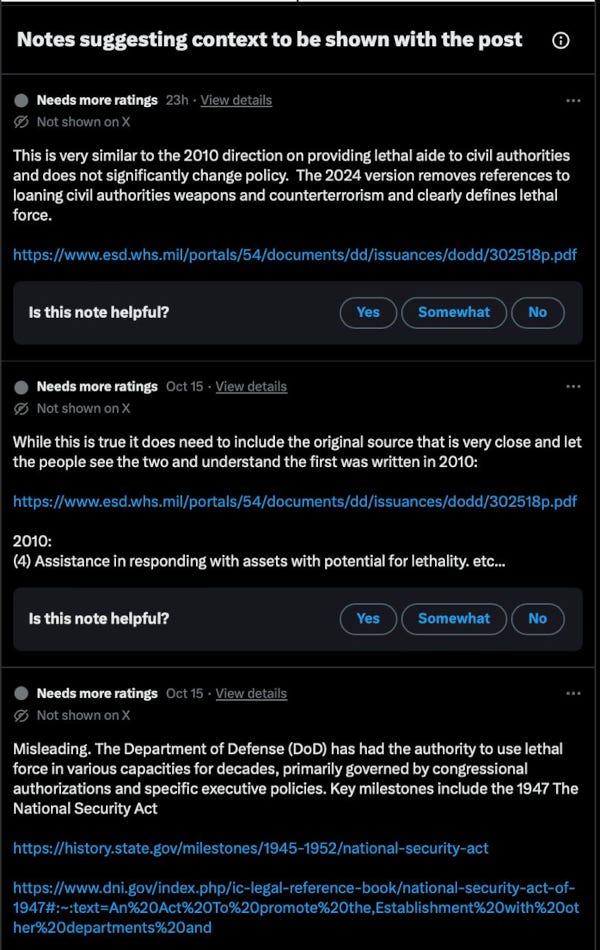
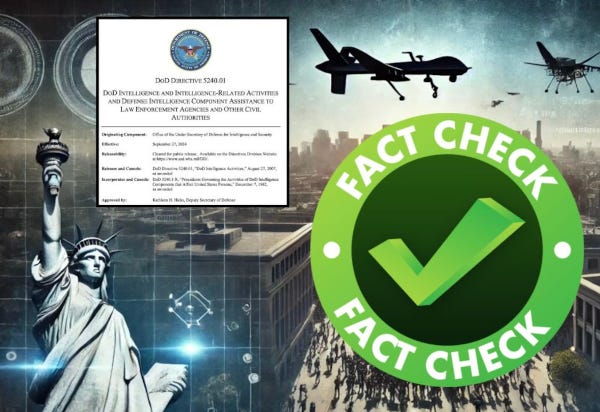
It was certain to come as it's been the plan all along. The Commie's first attempt was to get the population stirred up enough to start trouble where the government could get the people to start something so they could justify using the military to cut them down like all commie countries.
This directive warrants attention from the incoming administration.